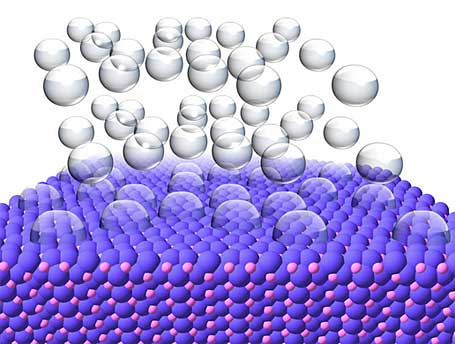
There are separate stories surfacing now about two different methods to create hydrogen: one using water and the other using ethanol as a feedstock.
Scientists at Penn State University have discovered that nickel and phosphorus nanoparticles (pictured above) will catalyze water into hydrogen as efficiently as any non-platinum materials now in existence.
According to Penn State, “To create the nickel phosphide nanoparticles, team members began with metal salts that are commercially available. They then dissolved these salts in solvents, added other chemical ingredients, and heated the solution to allow the nanoparticles to form. The researchers were able create a nanoparticle that was quasi-spherical — not a perfect sphere, but spherical with many flat, exposed edges.”
You can read the rest of the article here: http://science.psu.edu/news-and-events/news-events/2013-news/Schaak6-2013
Now, in a different discovery, scientists at the A*STAR Institute of Chemical and Engineering Sciences in Singapore have uncovered an efficient way to steam reform ethanol to create hydrogen without emitting carbon monoxide into the atmosphere.
According to Nanowerk, “While making a mixed catalyst is relatively straightforward, finding one that maximizes the benefits of both metals for efficient steam reforming is not as easy. Therefore, the team investigated how different metallic precursors could achieve an ideal interaction between Rh and Co atoms on the supporting surface. Their experiments revealed that catalysts consisting of Rh and Co, prepared from metal carbonyl precursors, gave high yields of extraordinarily clean H2 with no CO emissions at temperatures as low as 300 °C.”
You can read the rest of this article here: http://www.nanowerk.com/news2/green/newsid=30963.php
On National Dump the Pump Day, it is important that we talk about alternatives to non-renewable hydrocarbon fuels. The methods listed above won’t allow us to totally dump the pump per se, but will give us a cleaner pump that uses less fuel with no emissions. In the future we may just have a “Dump the Hydrocarbons Day” though it doesn’t have a poetic ring to it.